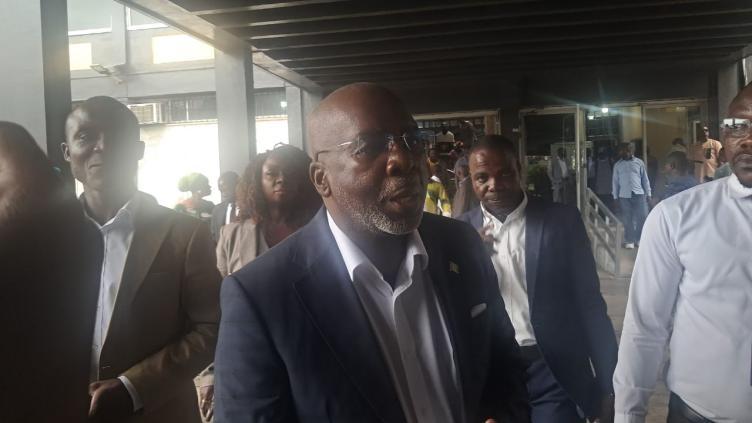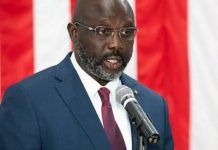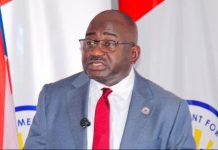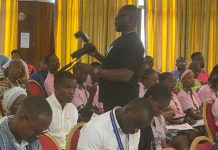Africa-Press – Liberia. With the court still short of the required 15-member panel to include 12 regular jurors and three alternates, the impanelment process remains incomplete. Former Speaker J. Fonati Koffa.
The ongoing jury selection in the high-profile Capitol Building arson case involving former House Speaker J. Fonati Koffa and four co-defendants again faced delays on Wednesday, November 19, as several prospective jurors failed to appear, prompting the court to issue contempt orders and remand two absentees to the Monrovia Central Prison.
On Wednesday, November 19, the court succeeded in selecting four additional jurors, bringing the total to 11, following the selection of seven on Tuesday.
The process, however, has been slowed not only by absenteeism but by a series of rejections on both sides of the aisle.
According to courtroom records, six prospective jurors were removed by the defense under peremptory basis, while prosecutors dismissed several others after they disclosed connections to both defense and prosecution lawyers, as well as familiarity with some defendants, particularly Representative Dixon Seboe, whom multiple prospective jurors said they knew from his residence in New Kru Town.
With the court still short of the required 15-member panel to include 12 regular jurors and three alternates, the impanelment process remains incomplete.
Judge Roosevelt Z. Willie disclosed that the Sheriff’s report indicated five prospective jurors were absent on Wednesday, including two who have not appeared since Tuesday, November 18, and three more who failed to show up on Wednesday.
“In view of the fact that the panel of jurors is incomplete,” Judge Willie announced, “prospective jurors will be assembled on Thursday, November 20, 2025, to ensure that the panel is complete.”
He then issued a stern warning and punitive orders that the three absentees must appear and show cause why they should not be held in contempt and the two other jurors who repeatedly refused to appear on Tuesday and Wednesday were ordered remanded at the Monrovia Central Prison for 14 days for contempt of court.
The court’s assertive stance highlights the strain the case continues to place on Liberia’s jury management system.
A Trial Under Heavy Scrutiny
The case stems from the December 2024 arson attack on the Capitol Building, which devastated critical parts of the Legislature’s working infrastructure, including document archives, committee offices, and essential administrative equipment.
The fire sparked fierce debate, with accusations that the attack was orchestrated to impede legislative oversight and disrupt governance during a politically sensitive period.
Former Speaker J. Fonati Koffa and four co-defendants were later indicted by a Montserrado County Grand Jury on multiple felony charges, including arson, criminal conspiracy, criminal mischief, and economic sabotage.
Prosecutors alleged that Koffa either played a direct role or facilitated the attack.
His supporters, however, view the indictment as politically motivated and lacking evidentiary weight.
Recent court proceedings have been tense.
Defense lawyers filed multiple challenges questioning the legality of the indictment and the neutrality of the prosecution team.
The government has maintained that no individual, including senior political figures, is beyond the reach of the law.
Judge Willie has repeatedly emphasized that the court will act free from political influence.
Yet the slow pace of juror impanelment, compounded by rejections and absences, has raised questions about the judiciary’s capacity to administer a case of this magnitude efficiently and fairly.
A Critical Test for Judicial Credibility
The repeated absence of jurors, coupled with numerous dismissals on grounds ranging from legal familiarity to personal relationships with defendants, underscores broader weaknesses in Liberia’s jury vetting system.
For a case accused of carrying deep political undertones, the credibility of the justice process is as much on trial as the defendants themselves.
Legal analysts warn that prolonged delays could deepen public skepticism and fuel perceptions that the system is either vulnerable to manipulation or ill-equipped to manage trials involving political elites.
As jury selection resumes Thursday, November 20, Criminal Court “A” faces a defining moment, to ensure that justice in the Capitol Building arson case proceeds transparently, impartially, and without fear or favor.
For More News And Analysis About Liberia Follow Africa-Press






